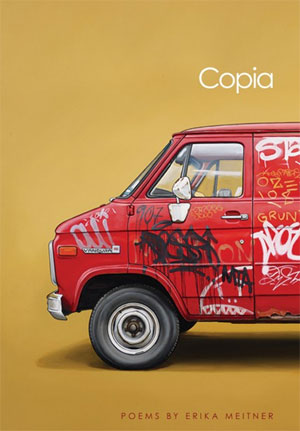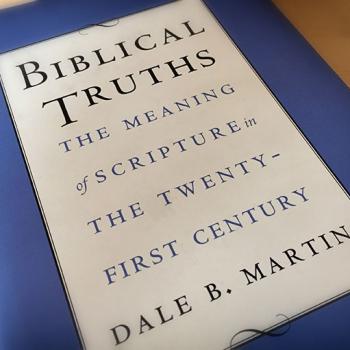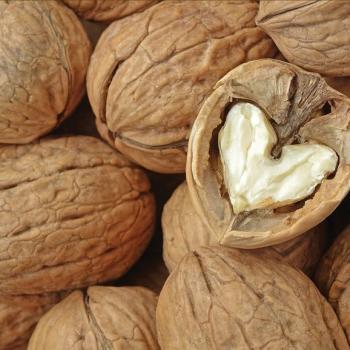In her new collection of poetry, Copia (BOA Editions Ltd., $16), Erika Meitner writes about urban and suburban life, consumption and excess, desire and disappointment, and perhaps mostly about loss and hope.
Meitner’s poetry traverses the nature of existence in a world that is both decaying and blossoming, in which the seemingly mundane provides passage to truth. For Meitner, relationships, language, faith, buildings, objects and life itself are simultaneously transitory and expansive, diminishing and abundant. Her poems gently explores these tensions, skillfully connecting the past with the present, and the concrete with the spiritual.
Meitner’s poems are deeply grounded in the physical world–for her, everyday objects are sources of revelation:
Objects around us are emitting light, transgressing,
repositories—
tropes, backdrops, ruination, lairs.from “Litany of Our Radical Engagement with the Material World”
It’s in the flotsam and jetsam of existence that Meitner finds meaning and connection:
And the detritus the July heat let loose:
gnawed Bic pen caps, a glowing Duncan Hines yo-yotangled in dead 9-volt connectors and envelopes
whose lips sealed shut from humidity that swelledthe windows into their frames. If you had scrawled
something on the inside of my wrist back thenit might have been a Venn diagram: your contented breath,
six glove-box necessities, the muffled places detritus would take us.from “with/out”
Though the subject matter of Copia often flirts with banality, Meitner’s imagery pushes beyond trite observation. Her poem “Wal★Mart Supercenter” offers up a ubiquitous scene of suburban America:
God Bless America says the bumper sticker on the racer-red
Rascal scooter that accidentally cuts me off in the Walmart parking lot
after a guy in a tricked-out jeep with rims like chrome pinwheels tries
to pick me up by honking, all before I make it past the automatic doors
waiting to accept my unwashed hair, my flip-flops, my lounge pants.
But interwoven with lines about buying tube socks and honey-mustard dipping sauce are a litany of disturbing occurrences at Walmart’s across the country:
In Port Charlotte, a woman’s body was found in a Jetta
in a Walmart parking lot. In a Walmart parking lot in Springfield,
a macaque monkey named Charlie attacked an either-year-old girl.
Which lead her to deeper reflections:
… I am not a Christian or
prone to idioms, but when the cashier says she is grateful for small mercies,
I nod in assent. Kyrie eleison, Christe eleison. The Latin root of mercy
mean price paid, wages, merchandise, though now we use it ascompassion shown to a person in a position of powerlessness,
and sometimes forgiveness towards a person with no right
to claim it. God is merciful and gracious, but not just.
Meitner even tackles that most novel of punctuation marks, the interrobang (‽), intended to “express modern life’s incredibility.” In its awkwardly overlaid lines she finds tragic beauty:
which is exactly the shape of naked John Lennon
wrapped around clothed Yoko Ono, their
intertwined bodies (eternal, glorified) capturedjust hours before he was shot—can you see
the way he clings to her as if he’s drowningin astonishment at his good luck?
John Lennon is dead and you and I–you and I (‽) are separated by miles
of ticking, snarled night.from “Interrobang”
The heart of Copia is a series of documentary poems about Detroit. Commissioned by Virginia Quarterly Review, Meitner traveled to Detroit and experienced firsthand the loss, decay and despair of a city that has been left for dead. She documents the city with reverence for both the life it once contained and the life it still holds.
In 1914, Henry Ford offered five dollars a day to the men
who assembled the Model T. And the dead were judged
according to their works. What kind of people
could walk away from something like this?
All of us. We like space, we like cars. A city
in decay releases energy: rebar, sirens, razor-
wire, spray paint, a guy pushing a shopping cart
down 2nd Street with a vacuum cleaner in it. Destroy
what destroys you. Then, from the ruins, Hallelujah.from “Post-Industrialization”
Copia is a collection that, like all good poetry, rewards repeated engagement. Meitner’s poems sometimes masquerade as simple reflections on the everyday, but between their lines hide startling associations and disconcerting realizations. This is what poetry should do: make us stop and take notice of everything happening–not just everywhere in our world and lives, but everywhere just beneath the surface of it all.
Because though this world is changing,
we will remain the same: abundant and
impossible to fill.from “Retail Space Available”
 Dan Wilkinson
Dan Wilkinson
Dan is a writer, graphic designer and IT specialist. He lives in Montana, is married and has two cats. He blogs at CoolingTwilight.com.













